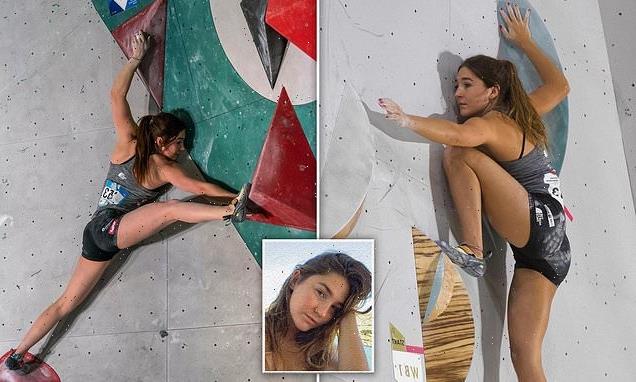Austrian broadcaster is slammed for its ‘objectification of the human body’ after showing lingering close-up shots of a female sport climber’s buttocks during world championship coverage
- International Federation of Sports Climbing has criticised the ORF’s coverage
- IFSC chief said: ‘How many times will things have to be done wrong, before we learn how to do them right?’
- It’s the second time channel has been pulled up for ‘sexualising’ female athletes
- Both incidents involved coverage of the 23-year-old climber Johanna Farber
Sports climbing’s governing body has slammed an Austrian broadcaster for featuring lingering close ups of the buttocks of a female athlete in its coverage of the world championships.
The International Federation of Sport Climbing (IFSC) issued a statement on Saturday condemning the ‘objectification of the human body’ in relation to clips shown of climber Johanna Farber during the ORF’s coverage of last week’s event in Moscow.
The body said it ‘would like to deeply apologise to Johanna Farber, Austria Climbing, all the athletes, and the entire Sport Climbing community for the images that were broadcast today during the women’s Boulder semi-final at the IFSC Climbing World Championships Moscow 2021.
‘The IFSC condemns the objectification of the human body and will take further action in order for it to stop, and to protect the athletes.’
Sports climbing’s governing body has slammed an Austrian broadcaster for featuring lingering close ups of the buttocks of female athlete Johanna Farber (pictured) in its coverage of the world championships
IFSC President Marco Scolaris said: ‘How many times will things have to be done wrong, before we learn how to do them right?’. This is the second time the OFC has been pulled up for its coverage of Farber, 23
The statement went on to relay a terse comment from IFSC President Marco Scolaris, made ‘after a meeting with representative of the Austrian team’:
‘How many times will things have to be done wrong, before we learn how to do them right?,’ he said.
Scolaris’ comment comes after the host broadcaster was forced to apologise to Farber for a similar incident during the World Cup in Innsbruck in June.
At the time, the ORF said: ‘We acknowledge that, for a brief moment, we chose to display the sport of climbing in the wrong way. We commit ourselves to keep working for a fair, equal and better representation of women’s sports.’
Following the incident in June, Farber, 23, said she had been inundated with messages about the coverage, which was broadcast into thousands of households across her native Austria then published on the IFSC’s official YouTube page.
‘Honestly wtf?’ she wrote on Instagram at the time. ‘Having this slow-motion clip shown on NATIONAL TV and YouTube livestream is so disrespectful and upsetting.
‘We need to stop sexualising women in sports and start to appreciate their performance’ Farber said after the first incident in June
‘I’m an athlete and here to show my best performance. To be honest I do really feel so embarrassed to know that thousands of people saw this. We need to stop sexualising women in sports and start to appreciate their performance.’
The sport of climbing gained new prominence this year when it made its Olympic debut at the Tokyo Games.
However, the incidents involving the coverage of female athletes remains an issue.
‘Once more, such an event serves as a reminder to recognise that objectification occurs in climbing,’ specialist publication Gripped magazine wrote after the incident in June.
‘How might climbing include new demographics in the sport when it struggles to respect those already participating?’
The sexualisation of female athletes made headlines around the world this year after Norway’s women’s beach handball team was fined £1,270 for wearing shorts during a match instead of bikini bottoms in protest over rules on uniforms for female players.
International Handball Federation rules state that ‘female athletes must wear bikini bottoms’ and which must have ‘a close fit’, are ‘cut on an upward angle toward the top of the leg’ with a side depth of no more than 10 centimetres.
However, there appears to be no competitive advantage to the skimpier uniform, and male players may wear basketball-style shorts, leading some to suggest the uniform contributes to the sexualisation of female athletes.
Following the incident in June, Farber said she had been inundated with messages about the coverage, which was broadcast into thousands of households across her native Austria then published on the IFSC’s official YouTube page
Source: Read Full Article









